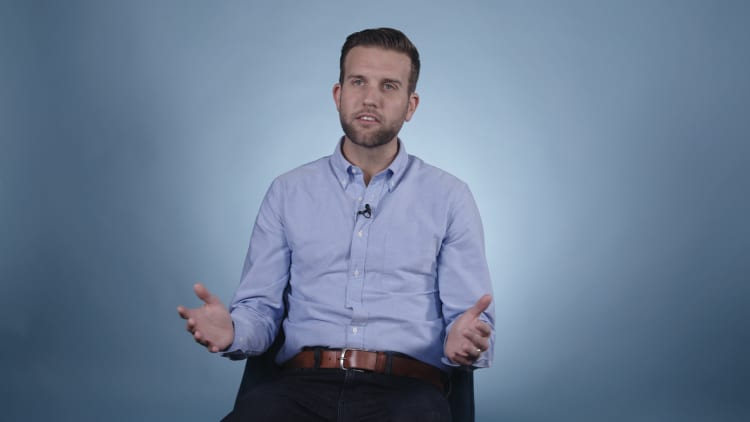If you are a Mastercard credit card user, you're not alone. In fact, you have a lot of company.
In the third quarter of 2019, there were 926 million Mastercard credit cards in use globally and 240 million in the U.S., according to Statista. That's around two Mastercards for every three U.S. residents.
Mastercard's success hasn't just panned out well for the company, it's also proven to be a major positive for long-term investors. A $1,000 investment in the company 10 years ago would be worth more than $12,500 as of Jan. 14, 2020, for a total return of 1,160%, according to CNBC calculations. By comparison, in the same time frame, the S&P 500 had a total return of just over 250%. Mastercard's current share price is hovering around $320.
CNBC: Mastercard's stock as of January 2020.
While Mastercard's stock has done well over the years, any individual stock can over- or underperform and past returns do not predict future results.
The Mastercard brand
Although Mastercard is widely known for its financial services, it maintains that it's a tech business first. The corporation refers to itself as "a technology company in the global payments industry" with "innovative technology" that sets it apart from competitors.
In recent years, Mastercard has focused on developing several new products and services, including:
- Just Tap & Go: Contactless payment options that allow you to make purchases using just a tap of your card or device.
- Mastercard In Control: Makes it so that you can control how, where and when cards issued under your name or business are used.
- A click-and-pay online checkout experience: This tool streamlines the checkout process for e-commerce business owners.
Globally, Mastercard has six tech hubs, where teams of developers and engineers work to develop new technologies for digital payments processing, cyber security and more. The company has also established several Mastercard Labs, where employees come up with new payment-related concepts before testing them and scaling them for global implementation.
In January 2020, the company launched a new augmented reality app, the first of its kind in the credit card industry, that helps cardholders learn more about their benefits by transporting them into virtual rooms.
This month, Mastercard also made its music industry debut by releasing its first-ever single in collaboration with Swedish artist Nadine Randle. The melody of "Merry Go Round" will act as Mastercard's new sonic trademark and will sound wherever users make a transaction or engage with the company, according to a Mastercard news release.
Additionally, Mastercard may have an easier time breaking into the Chinese market after China and the U.S. signed a new trade deal agreement on Jan. 15, according to The Wall Street Journal. This new agreement eliminated several of the obstacles that were preventing U.S. banks and financial companies from operating in China. If Mastercard is able to tap into the Chinese market, it could mean major growth.
Mastercard's past challenges
While Mastercard has made impressive advances within tech, it's also seen its fair share of setbacks. Often, the biggest controversies are settled in court and sometimes involve pricey consequences.
In 2010, the government filed a civil antitrust lawsuit against Mastercard and its close competitors Visa and American Express. This filing challenged anti-competitive rules imposed by these credit issuers that prohibited merchants from rewarding customers for using cash, checks or other forms of payment that don't carry transaction fees. A settlement was reached in 2011, stating that Visa and MasterCard must permit merchants to offer rewards, such as discounts, if shoppers choose to use alternate forms of payment.

In September 2018, Mastercard, Visa and a few top banks that issue credit and debit cards agreed to pay $900 million to settle a class-action lawsuit filed in 2005. (Mastercard's share of the settlement came to $108 million.) That was on top of the $5.3 billion paid to merchants in 2012. The case alleged that these financial institutions had set fees that benefited banks, but hurt merchants. One claim described how Visa and Mastercard would enforce fees that the banks would then charge to the merchants.
In January 2019, the European Commission fined Mastercard $650 million after a six-year investigation by European antitrust regulators concluded that the corporation had artificially upped the cost of card payments within the EU. Mastercard did not try to challenge the fine, but said in a statement that it had stopped charging the payment processing fees "long ago," The New York Times reported.
Mastercard stock performance
Mastercard has been a steady stock that's mainly been on the rise since its IPO date in May 2006.
In November 2018, Mastercard's stock experienced a downturn of 5% — but since then, its shares have been on the mend. In 2019 alone the company's stock rose more than 50%. And in October 2019 its third-quarter earnings beat Wall Street predictions with earnings per share coming to $2.15, as opposed to the expected $2.01.
If you are considering getting into investing, start by sticking to the basics. "Develop an overall plan, keep expenses low, diversify, rebalance," David Wilson, a certified financial planner at Watts Capital in New York, told CNBC.
If going it alone feels too intimidating at first, Wilson suggests starting to invest with the help of a robo-advisor, which is a digital platform that provides automated, algorithm-driven financial advice at a low cost.
Here's a snapshot of how the markets look now.
Like this story? Subscribe to CNBC Make It on YouTube!
Don't miss:



